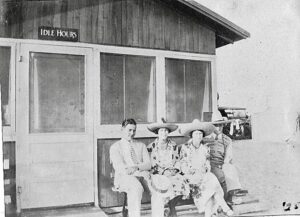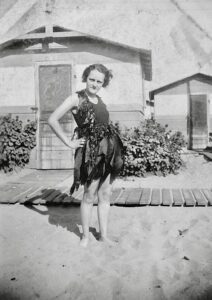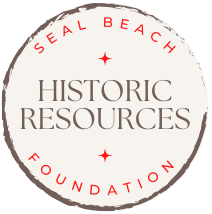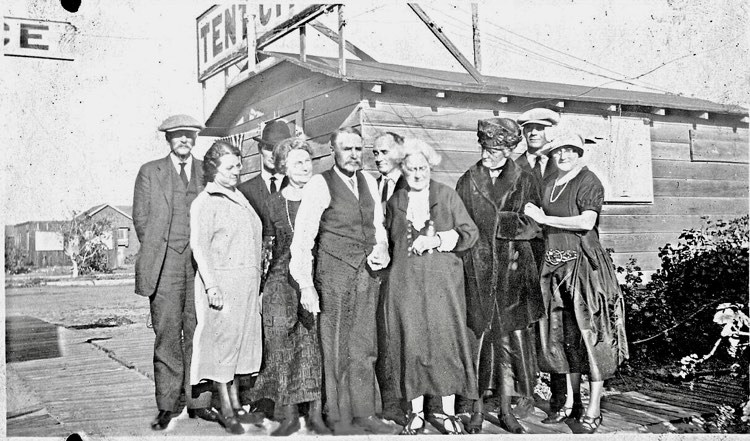Interviewed & Transcribed by Libby Appelgate – August 2, 1993
Norma has lived in Seal Beach since 1919. She taught piano and saw the Jewel City Café in its entire splendor. She knows about gambling in Seal Beach, since its inception. Her mother was the first woman Mayor of Seal Beach. Her experience is not all political. She remembers the balmy days and the swimming at Anaheim Bay before the Navy came in and moved the houses out concluding the end of an era.
LIBBY: Norma, will you please give me your full name and address?
NORMA: Norma Pranter, 316 ½ 10th Street, Seal Beach.
LIBBY: What was your maiden name?
NORMA: Reed.
LIBBY: Where were you born?
NORMA: Phoenix, 1910.
LIBBY: Tell me about the house that you lived in when you first came to Seal Beach.
NORMA: Well, we had a resort down on the beachfront called Tent City. We had a house down there that we lived in. It was just a small place. It was on Ocean Ave. between 13th and 14th streets. We lived there until 1938 and then moved over here.
LIBBY: Is this where you have lived ever since?
NORMA: No, I lived on 12th Street for a while in a duplex and then my parents moved this house in from the airport.
LIBBY: Did you live here with your parents?
NORMA: Yes, and my grandparents.
LIBBY: Tell me about your parents and your grandparents and what were their names?
NORMA: My parents were Everett and Jesse Reed and my grandparents’ names were James and Sarah Reed.
LIBBY: When and where were they born? First, your parents.
NORMA: My mama was born in Illinois and Daddy in Massachusetts. I think my grandfather was born in Maine and I don’t remember where my grandmother was born.
LIBBY: Where did your parents meet and marry?
NORMA: They met in Phoenix. Mama’s father had tuberculosis and Daddy’s first wife had TB. They both came because of the dry climate but they both died. Then Mom and Dad got married.
LIBBY: What year did you move here to Seal Beach?
NORMA: 1919.
LIBBY: When you lived here in Seal Beach, what church did you attend?
NORMA: Methodist.
LIBBY: A lot of people in town attended that church, I understand.
NORMA: It was the only church here at that time.
LIBBY: I think it was established in 1915.
NORMA: It was over on 6th Street, then moved to 10th.
LIBBY: I remember hearing the Seal Beach Elementary School was damaged in the 1933 earthquake. Do you remember that?
NORMA: Oh, yes. I was in the fifth grade and there were only four kids in the fifth grade. They put two of us back and two of us up and eliminated the fifth grade.
LIBBY: Did Seal Beach Elementary go from Kindergarten to eighth grade then?
NORMA: Yes, then we went to Huntington Beach High School after graduation from Seal Beach.
LIBBY: Now, during the 1933 earthquake you were in the fifth grade?
NORMA: No, I was out of school. I was nine when I was in the fifth grade.
LIBBY: Then you moved here in the fifth grade?
NORMA: Yes, that was 1919.
LIBBY: Do you remember the big earthquake in 1933?
NORMA: I sure do. I was at the Hellman Ranch, visiting and having dinner. I asked to please pass the biscuits and here they came flying just as the earthquake hit. My father came to pick me up and we went over to Long Beach and got over the city line before they closed it off and drove down Anaheim Street to look at the damage.
LIBBY: I just interviewed Florence Tyler whose husband was the foreman at the ranch. Were you eating with Florence?
NORMA: No, I was with Mary Tyler. She is Florence’s sister-in-law.
LIBBY: Who were your special friends in Seal Beach?
NORMA: Oh, Mary Harrington, David Morris and my very best friend was Esther Reed. She just died three months ago. One by one, they’re going.
LIBBY: Now, Reed was your family name. I guess there were other Reeds in town. Reed is a name that has been heard in town for awhile.
NORMA: Well, Mama was the Mayor for awhile.
LIBBY: What were some of your friends like? Describe them.
NORMA: David Morris was tall and he had a brother. The others, I can’t remember.
LIBBY: In what school activities were you interested?
NORMA: Baseball, hockey and swimming.
LIBBY: Did you go to the beach a lot?
NORMA: Oh yes, we just lived on the beach.
LIBBY: What was the social life in Seal Beach as a teenager?
NORMA: It was a small town and we all knew each other. We went to the youth group at the church. We had beach parties. Seal Beach was more of a beach resort, not too many residents. We had a campground next to Tent City and people would lease the ground and they would come down every summer. One of my best friends was one of these people.
LIBBY: Describe Tent City.
NORMA: They were little houses with wood up so far with canvas.
LIBBY: Did people live in Tent City year round?
NORMA: No, it was just a resort.
LIBBY: Did they have any plumbing inside?
NORMA: No, there was water inside but they had to go to public restrooms.
LIBBY: There’s a little blue house on 12th Street. I thought that was one of the wooden tents.
NORMA: I don’t know about that one, but the little shed next to my house is from Tent City.
LIBBY: Did you have a car and what make was it?
NORMA: We had a Model T that we drove down from Tulare in and then my father had a Model A coupe that he gave to me and I drove it for quite awhile.
LIBBY: There weren’t many people in town so there wasn’t much to do as a young person was there?
NORMA: I think there were 12 people that graduated from 8th grade. I have a picture of the class.
LIBBY: Were there many seals in Seal Beach?
NORMA: Yes, down at the mouth of the river where the trestle used to be at 1st Street.
LIBBY: What is the full name of your husband?
NORMA: Lewis Hendrick Pranter.
LIBBY: When and where did you meet him?
NORMA: We met in Long Beach. He lived with his cousins.
LIBBY: When and where were you married?
NORMA: Yuma, Arizona in 1936.
LIBBY: Where have you lived since your marriage?
NORMA: Right in Seal Beach.
LIBBY: How long in this house?
NORMA: Since 1940. This house was the office down at the airport. Then they moved it down next to City Hall and used it for OPA and Red Cross. Then Mama bought it and the city had to move it to 19th Street. There was one bedroom and Daddy partitioned it off and made two.
LIBBY: What about the house in front?
NORMA: It was moved from Tent City. Some people built it out on the campground and didn’t pay their rent so the folks took it back and moved it over here.
LIBBY: You bought the property first before moving these houses here, is that right?
NORMA: Yes, I bet they didn’t pay more than $200 for this lot.
LIBBY: In what year was that?
NORMA: 1937.
LIBBY: How many children did you have?
NORMA: One, and her name is Lynne.
LIBBY: How many grandchildren?
NORMA: I have three grandchildren and five great-grandchildren.
LIBBY: What are your hobbies? What are things you like to do?
NORMA: Not much of anything anymore. Watch TV and listen to books on tape.
LIBBY: What did you do earlier in your life?
NORMA: Well, I played the piano and I gave piano lessons for a long time. I played for the church choir when I was nine years old.
LIBBY: How old are your great-grandchildren?
NORMA: The oldest is 23, then 12, 10, and one is a little over a year old. Ryan, Matthew, Josh, Sarah and April.
LIBBY: We are interested in the history of the Jewel Café on the pier in the 1920’s. Can you describe the place?
NORMA: Well, it was really ornate. The buildings had been moved here from San Francisco [NOTE: Only a very few things were moved here from San Francisco – the scintillators, and the roller coaster cars. Because it was far cheaper, everything else was constructed here). It was a nice place. On the other side of the pier there was a dance hall. A wonderful place.
LIBBY: Was the rollercoaster and pavilion here when you first arrived in this town?
NORMA: Yes, in 1919. There were concessions along the front, on the boardwalk.
LIBBY: Then in the 1930’s it seemed to deteriorate.
NORMA: The Bayside Land Company owned it and they went broke. The Bank of America took over the property. Then they tore it down.
LIBBY: I understand the rollercoaster burned down?
NORMA: Yes, but not bad. They just went bankrupt.
LIBBY: Do you remember the Hellman Ranch?
NORMA: Oh, yes. I was up there quite a bit because Mary Tyler and I were good friends and I went with one of the fellows that worked out there.
LIBBY: Did Mary live with the Hellmans?
NORMA: No. There was one house that was the cookhouse and that’s where Florence and Hubert lived. There was a bunkhouse for the farm workers and Mary had a house. The Hellmans didn’t live there at that time. They raised sugar beets and alfalfa and Hubert Tyler was the farm manager.
LIBBY: What did Main Street look like in the 1920’s?
NORMA: I’ll show you a picture of it. (Norma brought out some photos of Seal Beach in the 1920’s.) Main Street was a dirt road. PCH was still a dirt road. It was very undeveloped around here except for the pavilion on the pier and the Red Car that brought people here from Los Angeles. The tracks can be seen laid down onto the dirt road down Main Street.
LIBBY: What do you know about gambling in Seal Beach?
NORMA: In the 1920’s there was a lot of bootlegging. They used to do rumrunning down at Anaheim Landing and you could hear shooting once in awhile. There was a café at Electric and at Jewel City where booze was sold during prohibition. Daddy used his Model T to take people to these spots.
LIBBY: How would they get away with this?
NORMA: They would hide the bottles. Then when Robertson came to town, he got gambling started.
LIBBY: He was a retired police officer from Los Angeles, wasn’t he?
NORMA: Yes, and he was an evil man.
LIBBY: But the town had to want gambling, because they made it legal.
NORMA: My mother fought against gambling when she was Mayor and he did a lot of dirty things to her.
LIBBY: Like what?
NORMA: Well, he printed nasty stories in his newspaper. He intimated that she was running a brothel at Tent City. She owned Tent City.
LIBBY: Was that done so she wouldn’t become elected?
NORMA: Oh, yes. But she was elected anyway. Robertson tried to buy mother off but she told him, “NO!”
LIBBY: Was gambling going on before Robertson came to town?
NORMA: There were the gambling boats. You could go out there and get a free meal if you wanted to gamble and drink on the boats.
LIBBY: Did Robertson have anything to do with the gambling on the boats?
NORMA: No, I don’t think he had anything to do with those. But people were beaten up if they didn’t agree to what he wanted to do.
LIBBY: How many brothels were in Seal Beach in the 1920’s and 30’s?
NORMA: There was one at 147 Main Street. It was a hotel and it finally burned down. I don’t know where the others were.
LIBBY: People say there was gambling and there were brothels for the ranch hands at Bixby Ranch and the oil field workers in Huntington Beach.
NORMA: Maybe were but we didn’t know about that. It must have been kept a secret.
LIBBY: What kind of restaurants were in town in the 20’s and 30’s?
NORMA: Hamburger stands and hot dog stands. Kenny and Boots Nash had a hamburger stand later on in the 40’s. Then there was the Glide’er Inn. It was one of the first restaurants. It was across the street from where it is now. I can’t remember others. It was too long ago.
LIBBY: Did you know Mr. Bill Robertson?
N: I sure did, and I didn’t like him.
LIBBY: Did you ever have a conversation with him?
NORMA: Yes, I had a run-in with him.
LIBBY: What was that about?
NORMA: Well, I wrote to him and told him I thought he ought to put a retraction in the newspaper about mom because he kept bringing it up all the time.
LIBBY: This was in 1940’s when she was running for office?
NORMA: I think so. Anyway, they called me up and wanted me to come down and talk to him in his office but later said, “Don’t come down here, it is bugged, come to my house”. So I told him again that was a dirty thing to do and you should put in a retraction. He said, “No, I can’t do that, but is there anything else I can do for you?”
LIBBY: Meaning?
NORMA: I don’t know what he meant. He wasn’t a very nice man.
LIBBY: Why do you think gambling became legal in Seal Beach?
N: Well, there weren’t enough people to get together and stop it. But we really got organized and worked real hard to get rid of gambling and Robertson. We voted him out.
LIBBY: It was put to the vote of the people in 1954.
NORMA: Yes.
LIBBY: Back to the ranch. After the bombing of Pearl Harbor, the government took the Japanese Americans that lived in Seal Beach off the Hellman Ranch where they raised beautiful flowers and put them in camps.
NORMA: Yes, there was a Japanese family where the Navy is now. They had a farm out there. The government took them and we had gone to school with the kids and knew them real well. Seal Beach was a nice place to grow up. We could run all over town with no one bothering us. We would swim in the bay (Anaheim Bay) and the weather and the beaches were a paradise. There was nobody here but us.
LIBBY: I used to hear that people didn’t like Seal Beach at one time.
NORMA: Oh, Seal Beach had a bad reputation. You just didn’t tell people you lived in Seal Beach.
LIBBY: I used to think that when I moved here in 1953 that Seal Beach had a bad reputation because of “it’s where the sewer meets the sea.” I heard this from the kids from out of town. I guess it was the runoff from the San Gabriel River that made the beach so dirty in the winter.
NORMA: Yes, I did too. But we were happy living here in Seal Beach. There are too many good things to remember.




